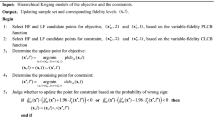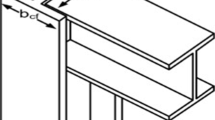Abstract
Constraints widely exist in the structural optimization problems, including not only expensive constraints but also inexpensive constraints with explicit or implicit analytical expressions. Simply omitting the infeasible sampling points generated by conventional design of experiments (DoE) techniques leads to fewer feasible points than desired and to the remaining points distributed sub-optimally. This paper presents a novel constrained space-filling and non-collapsing sequential sampling (CSFSS) method for the arbitrarily constrained design space. To this end, an improved local density is firstly proposed to measure the spatial distribution of the sampling points located in the feasible region. Then, a novel formulation based on the improved local density is proposed for the criterion of sequential sampling strategies, which can guarantee the space-filling and non-collapsing properties both preferably optimal. Afterwards, several methods are proposed to tackle the challenging multimodal optimization problem posed by sequential sampling strategies. Finally, a replacement-based strategy is proposed to further elevate the quality of the design. Extensive numerical results, including an application for the lightweight design of cylindrical stiffened shells in aerospace engineering, highlight the satisfying performance of the proposed method not only in obtaining a high quality of constrained experimental designs but also in competitive contributions to constrained optimization gains.




















Similar content being viewed by others
References
Alex R (2014) Clustering by fast search and find of density peaks. Science 6191:1492–1496
Ba S, Myers WR, Brenneman WA (2015) Optimal sliced Latin hypercube designs. Technometrics 57:479–487. https://doi.org/10.1080/00401706.2014.957867
Bates SJ, Sienz J, Langley DS (2003) Formulation of the Audze–Eglais uniform Latin hypercube design of experiments. Adv Eng Softw 34:493–506. https://doi.org/10.1016/S0965-9978(03)00042-5
Borkowski JJ, Piepel GF (2009) Uniform designs for highly constrained mixture experiments. J Qual Technol 41:35–47. https://doi.org/10.1080/00224065.2009.11917758
Chen RB, Hao LC, Ying H, Wang W (2019) Optimal noncollapsing space-filling designs for irregular experimental regions. J Comput Graph Stat 28:74–91. https://doi.org/10.1080/10618600.2018.1482760
Cho I, Lee Y, Dongheum R, Hoon CD (2017) Comparison study of sampling methods for computer experiments using various performance measures. Struct Multidiscip Optim 55:221–235. https://doi.org/10.1007/s00158-016-1490-6
Coetzer R, Haines LM (2017) The construction of D- and I-optimal designs for mixture experiments with linear constraints on the components. Chemom Intell Lab Syst 171:112–124. https://doi.org/10.1016/j.chemolab.2017.10.007
Crombecq K, Laermans E, Dhaene T (2011) Efficient space-filling and non-collapsing sequential design strategies for simulation-based modeling. Eur J Oper Res 214:683–696. https://doi.org/10.1016/j.ejor.2011.05.032
Draguljie D, Dean AM, Santner TJ (2012) Noncollapsing space-filling designs for bounded nonrectangular regions. Technometrics 54:169–178. https://doi.org/10.1080/00401706.2012.676951
Fuerle F, Johann S (2011) Formulation of the Audze–Eglais uniform Latin hypercube design of experiments for constrained design spaces. Adv Eng Softw 42:680–689. https://doi.org/10.1016/j.advengsoft.2011.05.004
Fuerle F, Johann S (2013) Decomposed surrogate based optimization of carbon-fiber bicycle frames using optimum Latin Hypercubes for constrained design spaces. Comput Struct 119:48–59. https://doi.org/10.1016/j.compstruc.2012.11.014
Garbo A, German BJ (2019) A model-independent adaptive sequential sampling technique based on response nonlinearity estimation. Struct Multidiscip Optim 61:1051–1069. https://doi.org/10.1007/s00158-019-02404-6
Gebhardt C (2015) Maximum entropy sampling. J Appl Stat 14:165–170. https://doi.org/10.1080/02664768700000020
Hickernell F (1996) A generalized discrepancy and quadrature error bound. Math Comput:67. https://doi.org/10.1090/S0025-5718-98-00894-1
Johnson ME, Moore LM, Ylvisaker D (1990) Minimax and maximin distance designs. J Stat Plan Infer 26:131–148. https://doi.org/10.1016/0378-3758(90)90122-B
Joseph VR, Evren G, Shan B (2020) Designing computer experiments with multiple types of factors: the MaxPro approach. J Qual Technol 52:343–354. https://doi.org/10.1080/00224065.2019.1611351
Kitayama S, Masao A, Koetsu Y (2011) Sequential approximate optimization using radial basis function network for engineering optimization. Optim Eng 12:535–557
Lacaze S, Samy M (2014) A generalized "max-min" sample for surrogate update. Struct Multidiscip Optim 49:683–687. https://doi.org/10.1007/s00158-013-1011-9
Lekivetz R, Bradley J (2015) Fast flexible space-filling designs for nonrectangular regions. Qual Reliab Eng Int 31:829–837. https://doi.org/10.1002/qre.1640
Liu HT, Soon OY, Fei CJ (2018) A survey of adaptive sampling for global metamodeling in support of simulation-based complex engineering design. Struct Multidiscip Optim 57:393–416. https://doi.org/10.1007/s00158-017-1739-8
Long T, Wu D, Guo X, Gary WG, Li L (2015) Efficient adaptive response surface method using intelligent space exploration strategy. Struct Multidiscip Optim 51:1335–1362. https://doi.org/10.1007/s00158-014-1219-3
McKay MD, Beckman RJ, Conover WJ (2000) A comparison of three methods for selecting values of input variables in the analysis of output from a computer code. Technometrics 42:55–61. https://doi.org/10.1080/00401706.2000.10485979
Meyer Piening HR, Farshad M, Geier B, Zimmermann R (2001) Buckling loads of CFRP composite cylinders under combined axial and torsion loading – experiments and computations. Compos Struct 53:427–435. https://doi.org/10.1016/S0263-8223(01)00053-8
Montgomery DC, Loredo EN, Duangporn J, Caner TM (2002) Experimental designs for constrained regions. Qual Eng 14:587–601. https://doi.org/10.1081/QEN-120003561
Morris MD, Mitchell TJ (1995) Exploratory designs for computational experiments. J Stat Plan Infer 43:381–402. https://doi.org/10.1016/0378-3758(94)00035-T
Perrin G, Claire C (2017) A repulsion-based method for the definition and the enrichment of optimized space filling designs in constrained input spaces. Journal de la Société Française de Statistique 158:37–67
Piepel GF, Stanfill BA, Cooley SK, Bradley J, Kroll JO, Vienna JD (2019) Developing a space-filling mixture experiment design when the components are subject to linear and nonlinear constraints. Qual Eng 31:463–472. https://doi.org/10.1080/08982112.2018.1517887
Regis RG, Shoemaker CA (2005) Constrained global optimization of expensive black box functions using radial basis functions. J Glob Optim 31:153–171. https://doi.org/10.1007/s10898-004-0570-0
Stinstra E, Dick EH, Peter S, Arjen V (2003) Constrained Maximin designs for computer experiments. Technometrics 45:340–346. https://doi.org/10.1198/004017003000000168
Tenne Y (2013) An analysis of the impact of the initial sample on evolutionary metamodel-assisted optimization. Appl Artif Intell 27:669–699. https://doi.org/10.1080/08839514.2013.823324
Tian K, Wang B, Ke Z, Jiaxin Z, Peng H, Wu Y (2018) Tailoring the optimal load-carrying efficiency of hierarchical stiffened shells by competitive sampling. Thin-Walled Struct 133:216–225. https://doi.org/10.1016/j.tws.2018.03.029
Viana Felipe AC, Gerhard V, Vladimir B (2010) An algorithm for fast optimal Latin hypercube design of experiments. Int J Numer Methods Eng 82:135–156
Wang B, Peng H, Gang L, Yaochu F, Wang X, Xi Z (2013) Determination of realistic worst imperfection for cylindrical shells using surrogate model. Struct Multidiscip Optim 48:777–794. https://doi.org/10.1007/s00158-013-0922-9
Wang B, Peng H, Gang L, Kuo T, Kaifan D, Wang X, Xi Z, Xiaohan T (2014) Two-stage size-layout optimization of axially compressed stiffened panels. Struct Multidiscip Optim 50:313–327. https://doi.org/10.1007/s00158-014-1046-6
Wang Y, Xu B, Guangyong S, Yang S (2017) A two-phase differential evolution for uniform designs in constrained experimental domains. IEEE Trans Evol Comput 21:665–680. https://doi.org/10.1109/TEVC.2017.2669098
Wang ZX, Jun LY, Ping WZ, Xing OY, Da Peng Z, Ri LG (2020) Lightweight design of cylindrical stiffened shells in launch vehicles by a dual-elite population sequential approximation optimization approach. Eng Optim:1–21. https://doi.org/10.1080/0305215X.2020.1767097
Wu ZP, Hui WD, Patrick Okolo N, Yu JZ, Hua ZW (2016) Unified estimate of Gaussian kernel width for surrogate models. Neurocomputing 203:41–51. https://doi.org/10.1016/j.neucom.2016.03.039
Wu ZP, Hui WD, Jie WW, Kun Z, Okolo PN, Hua ZW (2019) Space-filling experimental designs for constrained design spaces. Eng Optim 52:1495–1508 https://doi-org-s.nudtproxy.yitlink.com/10.1080/0305215X.2018.1542691
Wullschleger L, Meyer Piening HR (2002) Buckling of geometrically imperfect cylindrical shells — definition of a buckling load. Int J Non Linear Mech 37:645–657. https://doi.org/10.1016/S0020-7462(01)00089-0
Zhao D, Xue D (2010) A comparative study of metamodeling methods considering sample quality merits. Struct Multidiscip Optim 42:923–938. https://doi.org/10.1007/s00158-010-0529-3
Acknowledgements
The authors also would like to thank the anonymous referees for their valuable comments.
Funding
The research is supported by the National Key R&D Program of China (2017YFB0306200), the National Natural Science Foundation of China (11902348), and the Research Project of National University of Defense Technology (ZK19-11).
Author information
Authors and Affiliations
Corresponding author
Ethics declarations
Conflict of interests
The authors declare that they have no conflict of interest.
Replication of results
Sufficient details of the implemented approach have been provided in this paper. All the results presented in this paper can be replicated following the procedure described in Section 3, and are provided in the Supplemental Material available online. Readers interested in the Matlab® codes for the CSFSS algorithm or the Python scripts for the cylindrical stiffened shells are encouraged to contact the corresponding author via email.
Additional information
Responsible Editor: Vassili Toropov
Publisher's note
Springer Nature remains neutral with regard to jurisdictional claims in published maps and institutional affiliations.
Supplementary information
ESM 1
(RAR 245 kb)
Rights and permissions
About this article
Cite this article
Wang, Z., Zhang, D., Lei, Y. et al. Constrained space-filling and non-collapsing sequential design of experiments and its application for the lightweight design of cylindrical stiffened shells. Struct Multidisc Optim 64, 3265–3286 (2021). https://doi.org/10.1007/s00158-021-02948-6
Received:
Revised:
Accepted:
Published:
Issue Date:
DOI: https://doi.org/10.1007/s00158-021-02948-6




